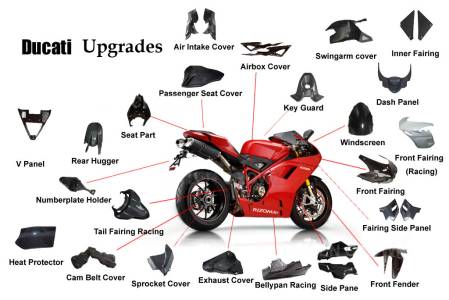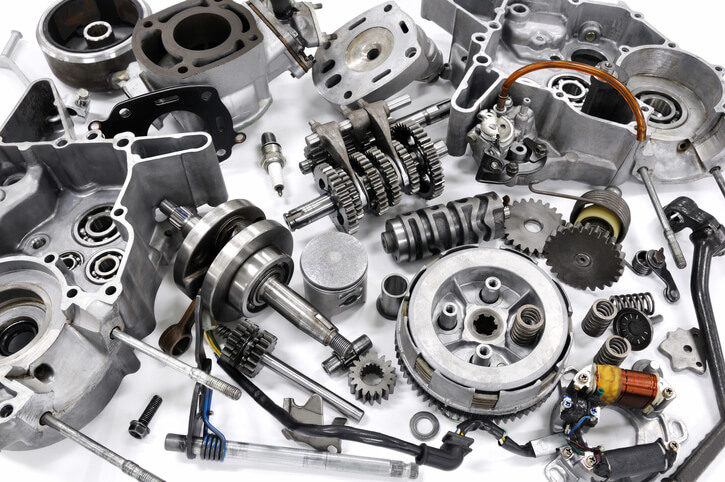How to Tell If Your Motorbike Components NZ Are Causing Performance Loss
How to Tell If Your Motorbike Components NZ Are Causing Performance Loss
Blog Article
Discover the Crucial Motorcycle Parts You Required for Optimum Efficiency
Understanding the important parts of a bike is basic for accomplishing peak efficiency. Each element, from the engine to the braking system, plays a vital role in overall performance and safety. Regular upkeep can avoid unanticipated failings and improve the riding experience. Nevertheless, many cyclists ignore the details of these systems. Finding how they collaborate can bring about a more reliable adventure. What important parts should every cyclist prioritize?
The Engine: The Heart of Your Motorcycle
The engine works as the core component of a motorbike, driving its efficiency and defining its capabilities. It is in charge of transforming gas right into power, which powers the bike ahead. Numerous sorts of engines are used, including single-cylinder, V-twin, and inline configurations, each offering distinct features fit for various riding functions and styles. The engine dimension, commonly gauged in cubic centimeters (cc), substantially influences performance, with bigger engines normally supplying more power and torque.Furthermore, the engine's layout and technology, such as gas injection systems or air-cooling versus liquid-cooling, affect performance and reliability. Maintenance is necessary for peak procedure; aspects like routine oil modifications and monitoring ignition system guarantee durability. Bikers usually take into consideration an engine's responsiveness and smoothness, as these qualities enhance the overall riding experience. Eventually, the engine continues to be an important element that defines not only the motorbike's performance however also the cyclist's link to the maker.
The Transmission: Changing Gears Smoothly
The transmission plays an important role in a motorbike's performance, particularly in the technicians of gear changing. Understanding how to change gears efficiently can boost the overall riding experience, while routine upkeep guarantees peak functionality. Appropriate attention to these elements can greatly influence the durability and effectiveness of the motorbike.

Gear Shifting Mechanics
Smooth gear changing is important for optimal motorcycle efficiency, significantly influencing both velocity and control. The technicians of equipment moving entail the interaction between the clutch, gear lever, and transmission system. When a biker involves the clutch, it disengages the engine from the transmission, permitting a gear modification without damaging the components. A well-timed launch of the clutch, incorporated with precise movement of the equipment lever, facilitates a seamless adjustment between equipments. This process guarantees that the engine operates within its finest power band, boosting efficiency. Motorcycle Spares Christchurch. In addition, recognizing the gear proportions and their impact on rate and torque can assist cyclists make notified selections throughout changes, eventually adding to a much more enjoyable and responsive riding experience
Upkeep Tips Importance
Routine upkeep plays a necessary function in assuring that the transmission system operates effectively, enabling smooth gear changes. On a regular basis checking and transforming the transmission liquid is vital, as old liquid can lead to boosted rubbing and wear. Furthermore, checking the clutch for wear guarantees peak engagement and disengagement, preventing slippage during gear adjustments. Lubrication of moving parts is just as vital to minimize rubbing and boost performance. Motorbike proprietors must also monitor for leaks and uncommon noises, as these can suggest underlying problems. By sticking to these upkeep suggestions, bikers can extend the life-span of their transmission system, assuring that gear changes stay smooth and contributing to the total efficiency of their motorbike.
The Braking System: Ensuring Security on Every Experience
Braking systems are essential elements that directly influence a motorcycle's safety and security and performance. They are composed of numerous components, consisting of brake pads, rotors, calipers, and hydraulic lines, all interacting to ensure efficient slowdown. The kind of stopping system-- commonly either disc or drum-- impacts responsiveness and quiting power.Regular upkeep is necessary to support peak efficiency; used brake pads can bring about decreased efficiency and enhanced quiting ranges. Furthermore, the quality of brake fluid need to be checked, as it can absorb dampness over time, endangering stopping efficiency.Riders should likewise consider the importance of anti-lock stopping systems (ABDOMINAL MUSCLE), which protect against wheel lockup during sudden stops, boosting total safety. Properly functioning brakes are not simply about stopping; they infuse confidence in the biker, permitting safer navigating through different surfaces. Ultimately, a dependable stopping system is essential for taking pleasure in every experience with comfort.
The Suspension: Enhancing Convenience and Control
A well-functioning suspension system substantially adds to a motorbike's total efficiency, complementing the efficiency of the stopping system. The suspension plays a substantial duty in absorbing shocks from irregular surface areas, assuring a smoother adventure while keeping tire contact with the roadway. This get in touch with is important for both security and control, allowing cyclists to navigate edges with self-confidence and precision.Different sorts of shock absorber, such as telescopic forks or mono-shocks, supply varying degrees of comfort and handling. Appropriately tuned suspension enhances responsiveness, offering the biker with a much more linked feel to the motorbike. Normal upkeep checks are very important to determine the suspension parts, including springtimes and dampers, are working at their finest. An continue reading this efficient shock absorber not only raises the riding experience but additionally adds to the long life of various other motorcycle components by reducing wear and tear. Consequently, buying top quality suspension is important for any significant motorcycle fanatic.
The Tires: Attaching You to the Roadway
Tires play a crucial function in a motorbike's efficiency, functioning as the main link between the motorcyclist and the roadway. Comprehending the different sorts of tires readily available can considerably affect dealing with and safety. Additionally, routine maintenance is important to ensure peak tire efficiency and longevity.
Tire Keys In Explained
How do different tire types influence a motorcycle's efficiency? Tire kinds play an important role in figuring out a motorcycle's handling, hold, and stability. Sport tires, made for high efficiency, offer improved grip and responsiveness on smooth roads, making them optimal for racing and hostile riding. On the other hand, visiting tires prioritize longevity and comfort, providing a smoother adventure for long-distance travel. Off-road tires, characterized by their sturdy tread patterns, master grip on unpaved surfaces, ideal for adventure enthusiasts. Additionally, dual-sport tires blend characteristics from both on-road and off-road groups, accommodating functional riding demands. Inevitably, picking the appropriate tire kind is essential for optimizing performance, ensuring safety and security, and boosting the total riding experience.
Upkeep Tips Offered
While riding on the roadway, keeping optimal tire condition is important for safety and performance. Regularly examining tire stress is necessary, as under-inflated tires can result in poor handling and increased wear. It is suggested to check walk depth regularly; worn tires compromise grasp and stability. On top of that, cyclists must search for signs of damages, such as fractures or bulges, which can indicate the need for replacement. Revolving tires occasionally assures even put on, enhancing long life. Additionally, keeping tires tidy from debris and avoiding extreme visuals can extend their life-span. Maintaining correct positioning and balance adds to peak efficiency, reducing stress and anxiety on various other bike elements. Abiding by these upkeep suggestions will greatly improve the overall riding experience.
The Fuel System: Sustaining Efficiency and Efficiency
The fuel system plays a crucial role in making best use of a motorcycle's efficiency and effectiveness, as it assures the optimum delivery of fuel to the engine. It consists of a number of critical elements, including the fuel container, gas pump, gas filter, and gas injectors or carburetor. Each component needs to work properly to assure a effective and smooth ride.The fuel tank stores gas and supplies it to the engine using the fuel pump, which creates the essential pressure. A fuel filter stops contaminants from going into the engine, while the injectors or carburetor mix fuel with air for combustion.Proper maintenance of the fuel system is important; a clogged up filter or malfunctioning injector can bring about decreased efficiency and increased gas intake. By validating that the gas system runs successfully, riders can enjoy better throttle reaction, far better gas economic climate, and generally enhanced riding experience.
The Electric System: Powering Your Ride
A reliable electrical system is necessary for the overall performance and security of a motorbike, as it powers vital elements such as the ignition, lighting, and various digital systems. This system includes the battery, which stores power, and the alternator, accountable for creating power while the engine runs. The wiring harness attaches these components, making sure trustworthy power distribution.Additionally, merges shield the system from overloads, while relays assist manage high-current devices with low-power signals. A well-kept electric system improves performance by making sure smooth beginnings and consistent operation of signals and lights, crucial for biker visibility and safety.Regular checks of the battery's charge and links are very important for stopping electric failings. Motorcyclists should likewise evaluate wiring for wear and tear, making certain all parts function ideally. Inevitably, a durable electric system contributes substantially to the overall efficiency and integrity of the motorbike.
Regularly Asked Questions
Exactly how Typically Should I Change My Motorbike's Battery?
The frequency of bike battery substitute useful reference relies on use and upkeep (Motorbike Components NZ). Usually, batteries must be replaced every 3 to 5 years. Regular checks can help determine when a substitute is needed for peak performance
What Devices Do I Required for Basic Bike Maintenance?
For basic bike upkeep, one calls for vital tools such as an outlet collection, wrenches, screwdrivers, pliers, tire stress gauge, and a torque wrench. These devices facilitate efficient maintenance and assure the bike runs efficiently and safely.
Exactly How Can I Improve My Motorcycle's Aerodynamics?
To improve motorbike aerodynamics, one ought to think about readjusting fairings, making use of windscreen extensions, optimizing body position, and decreasing general weight. These adjustments assist lessen drag, boosting security and gas effectiveness throughout experiences.
What Are the Indications of a Failing Electrical System?
Indications of a stopping working electrical system include dimming lights, trouble beginning, irregular tool analyses, and blown integrates. Motorbike Components NZ. Unusual smells or rust around battery terminals might also show underlying concerns needing immediate focus for safety and performance

How Do I Choose the Right Oil for My Motorcycle?
When selecting oil for a motorbike, one must consider the maker's requirements, thickness ratings, and the kind of riding. Additionally, synthetic versus standard top article oil can affect performance and engine defense, influencing the decision substantially. The engine size, usually measured in cubic centimeters (cc), considerably influences performance, with larger engines usually giving even more power and torque.Furthermore, the engine's design and modern technology, such as gas injection systems or air-cooling versus liquid-cooling, influence effectiveness and reliability. A well-functioning suspension system greatly adds to a motorbike's total performance, complementing the performance of the braking system. The gas system plays an essential role in maximizing a motorcycle's performance and performance, as it guarantees the optimum shipment of gas to the engine. A fuel filter stops contaminants from getting in the engine, while the injectors or carburetor mix fuel with air for combustion.Proper upkeep of the gas system is crucial; a clogged up filter or malfunctioning injector can lead to decreased efficiency and enhanced gas consumption. A well-kept electrical system improves efficiency by ensuring smooth begins and regular operation of signals and lights, vital for motorcyclist presence and safety.Regular checks of the battery's charge and links are vital for avoiding electric failings.
Report this page